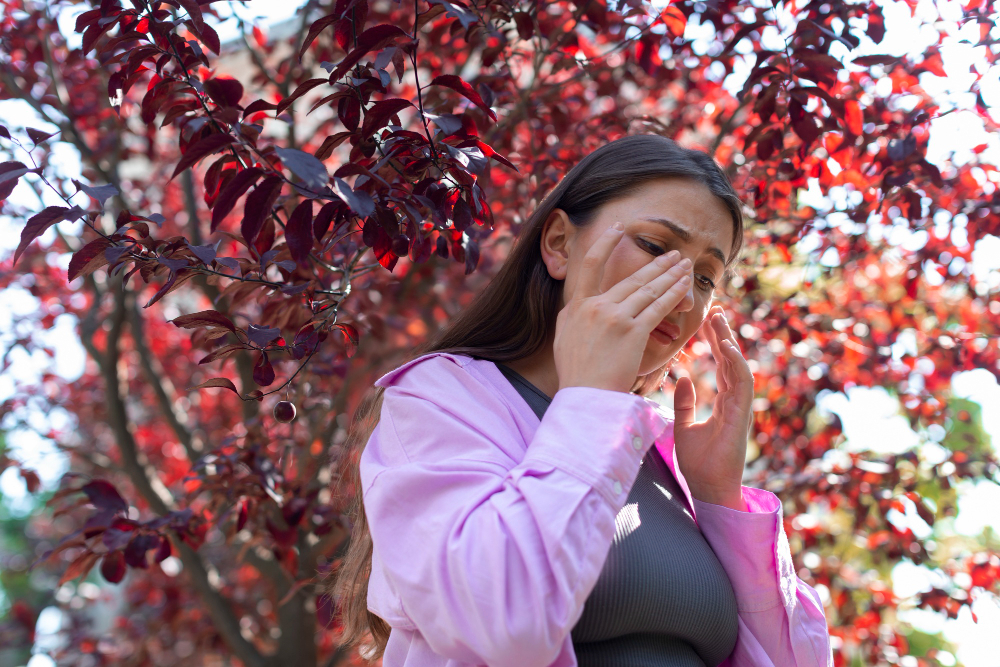
Can Grass Allergy Cause Anaphylaxis?
Anaphylaxis is a severe allergic reaction which is often life-threatening. You, or someone dear to you may have grass allergies, but can a simple grass allergy trigger such a serious reaction?
This question often looms in the minds of those who experience allergic reactions to grass, especially during the pollen-heavy seasons of spring and summer.
We understand how stressful it can be to suffer from/see someone close to you suffer from allergies. So, if you are wondering whether grass allergy can cause anaphylaxis, we are deep-diving into the facts to help you understand the connection between grass allergies and anaphylaxis.
We’ll explore anaphylaxis, how it differs from a typical allergic reaction, and what specific triggers can escalate a grass allergy into a more severe condition.
Understanding Grass Allergies
Grass allergies are triggered by the pollen released from various types of grass, including but not limited to Bermuda, Timothy, and Kentucky Bluegrass. While the symptoms are often mild, like sneezing, itchy eyes, and a runny nose, they can be bothersome enough to disrupt your daily activities.
During a grass allergy reaction, your immune system identifies the grass pollen as a foreign invader. In response to allergens, the body releases chemicals such as histamine, which can cause mild discomfort or more severe conditions like allergic rhinitis. Poor management of allergic rhinitis can further lead to sinus infections.
Moreover, grass allergies can be more problematic for people who enjoy outdoor activities. Whether you’re an avid gardener, a sports enthusiast, or simply someone who likes to spend time in parks, a grass allergy can put a damper on your outdoor experiences.
What is Anaphylaxis?

Imagine your body going into overdrive in response to an allergen, causing a cascade of symptoms that can escalate within minutes!
The symptoms of an allergy can include anything from hives and a sudden drop in blood pressure to more severe manifestations like difficulty breathing and loss of consciousness.
Anaphylaxis often involves more than one organ system like skin, respiratory system, or gastrointestinal tract. The reaction is often very quick, making it very dangerous.
Anaphylaxis: A Serious Concern
Understanding the gravity of anaphylaxis is crucial, as it can be the difference between life and death in extreme cases.
When anaphylaxis strikes, it’s a recipe for disaster inside your body, with symptoms escalating rapidly. The situation is so dire that it often necessitates an immediate injection of epinephrine, commonly known as adrenaline, to counteract the life-threatening symptoms.
Failing to treat anaphylaxis promptly can result in fatal consequences, making it imperative to understand its severity and act swiftly.
The Connection Between Grass Allergy and Anaphylaxis

While grass allergies are generally considered mild, there’s a potential for them to escalate into anaphylaxis under specific circumstances. For instance, engaging in vigorous physical activities like running or playing sports shortly after exposure to grass pollen can increase the risk of a severe allergic reaction.
Additionally, if you’re already susceptible to other types of severe allergies, such as food allergies or insect stings, the combination with grass pollen can trigger anaphylaxis. Therefore, understanding the connection between grass allergies and anaphylaxis is crucial for effective prevention and management.
Identifying Triggers and Symptoms
Knowing what triggers your allergies and recognizing the symptoms early on can be your first line of defense against escalating reactions. Common triggers for grass allergies include specific types of grass pollen, such as Bermuda and Timothy.
Symptoms usually manifest as sneezing, itchy eyes, watering eyes, blurry vision, scratchy throat or a runny nose. However, more severe cases can include difficulty breathing and anaphylaxis.
On the other hand, anaphylaxis triggers are often more severe. The symptoms are immediate and intense, requiring quick action for treatment.
Managing Grass Allergies and Preventing Anaphylaxis
Effective management of grass allergies and prevention of anaphylaxis starts with awareness and preparedness.
Avoiding grassy areas during high pollen seasons is a straightforward preventive measure. If you have a history of severe allergies, it’s advisable to always carry an epinephrine auto-injector.
Consulting healthcare providers for a comprehensive allergy management plan is also crucial. This plan may include medications to manage mild symptoms and steps to take in case of a severe reaction.
Regular check-ups and allergy tests can help improve how you manage your allergies. This means that you can live without worrying all the time about having severe allergic reactions.
If you have any doubts regarding grass allergy or anaphylaxis, we will be happy to help.
At Frontier Allergy, Asthma & Immunology, we provide personalized care for adults and children. For more information about our testing, treatments or work, click here!

Written/Reviewed by: Dr. Neha Reshamwala
NPI number: 1780874578
Page last reviewed: 03/11/2024


 All blog posts
All blog posts





